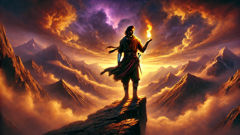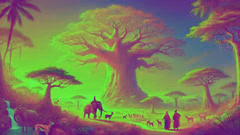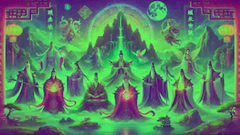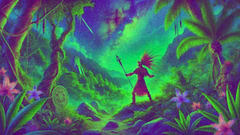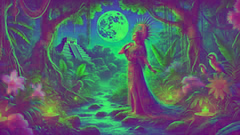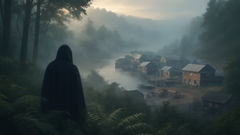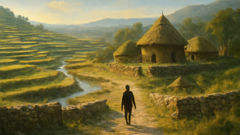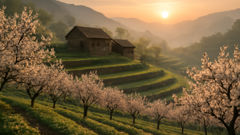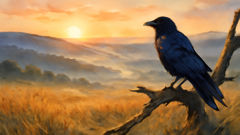Introduction
In the shadowy crags of the Caucasus Mountains, where the world’s ceiling meets the clouds and the winds carry whispers of creation, the legend of Amirani begins. Long before written words, when the earth was still young and the gods mingled with mortals, Georgia’s wild lands echoed with stories of this titan among men—a being neither wholly divine nor entirely of the earth, but caught between. Amirani’s tale unfolds in a landscape of stone and sky, where rivers slash through valleys and forests climb rugged slopes, and where every star seems to flicker in time to the pulse of ancient myths. It is a story not just of punishment and pain, but of extraordinary courage, of a spirit unbowed by fate, and of a gift that forever changed the fate of humankind. In these highlands, traditions run as deep as the roots of the beech and oak, and fires burn in the hearths of every village, warming families and forging bonds. But there was a time when fire belonged only to the gods—a fiercely guarded secret, hidden from mortals who shivered through long winters. It was Amirani, the mighty hero, who dared to break the silence of the heavens and bring that living flame down to earth. For this act of defiance, for his love of humanity and his refusal to accept the boundaries set by the divine, Amirani was bound in chains of unbreakable steel to the coldest mountain peak. There he suffered, watched by gods and men alike, but never repented. His legend endures in every flicker of firelight and every tale told beneath the velvet sky, a symbol of the resilience that runs through Georgia’s veins. What drove Amirani to risk everything? What secrets did he unlock—and what was the price of his rebellion? The answers lie in the windswept passes and ancient stones of the Caucasus, where his name is spoken with awe and hope, and where his spirit still roams, untamed and unbroken.
The Birth of Amirani: Son of the Mountains
It was said that before the world settled into order, when the gods themselves still shaped rivers and raised mountains with a word, the great goddess Dali roamed the high Caucasus slopes. Her hair shimmered like moonlit streams, and her eyes saw far into the hearts of men and beasts. Dali was revered as the huntress and guardian of wild animals, a spirit both nurturing and fierce, whose favor hunters sought with gifts and prayers. One night, as a silver mist curled along the ridges, Dali encountered a mortal named Darejani. His courage was well known—he had climbed to forbidden peaks and spoken with the winds, seeking wisdom beyond mortal ken. Their meeting was secret and fleeting, but from their union sprang a child unlike any other: Amirani.
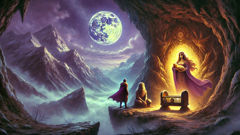
From the very beginning, Amirani was marked by destiny. He grew faster and stronger than other children, his laughter echoing through forests and along the riverbanks. By the time he could walk, Amirani’s hands could bend saplings, and by boyhood, he hunted wolves with his bare hands and scaled cliffs that left seasoned mountaineers trembling. But his gifts were not merely physical. He possessed an unquenchable curiosity and a restless longing to know the world’s mysteries. Dali, watching from the mountaintops, sent dreams and omens to guide her son, while Darejani, proud yet wary, taught him the stories of their people—their struggles, their joys, their fears.
Word of Amirani’s strength spread across the land. Villagers whispered his name with awe, telling tales of how he once calmed a raging river during a spring flood by hurling boulders to form a new course. Others claimed he could speak with eagles and that the wild dogs of the forests followed him like loyal companions. The gods took notice too. Some watched with fondness; others grew wary. For Amirani was not content with the gifts of his birth—he sought meaning beyond boundaries, asking questions that even the gods could not easily answer.
One early autumn, while the trees burned orange and the first snows dusted the highest crags, Amirani scaled a ridge where the sky felt close enough to touch. There, amid the silence, he felt the stirring of fate. It was not enough for him to be strong or wise—he yearned to change the world, to ease suffering, to help his people survive the brutal winters that claimed so many lives. It was in that wind-lashed solitude that his resolve crystallized: he would bring something new to humanity, a spark that would make life not just bearable but bright. He was still young, but in that moment, Amirani’s purpose was forged as unbreakable as the mountains themselves.
His mother’s spirit appeared to him in a dream, her face luminous in the moonlight. "The world is shaped by those who dare," she whispered. "But all daring has a price." Amirani woke with those words carved into his heart. He gathered his friends—Badri, wise beyond his years, and Usup, loyal and fiercely brave—and began to travel from village to village. They listened to the people’s stories, saw their hardships, and came to understand that their greatest fear was the winter darkness and the gods’ reluctance to share their warmth.
As the seasons turned and the snow deepened in the passes, Amirani grew convinced that the greatest gift he could bring was fire—a symbol of hope and survival. But fire belonged to the gods alone. To take it would be to challenge their will, to set himself apart forever. Yet, as Amirani watched children huddled in smoky huts and elders shivering through long nights, he resolved that some lines must be crossed for the sake of love and life. It was a decision that would ripple through time, turning a young hero into a legend and setting in motion a struggle that would shake the very foundations of heaven and earth.
The Theft of Fire: Defiance and Sacrifice
Winter settled on Georgia with relentless force. Villages huddled together in valleys, smoke rising in thin columns from hearths that barely glowed. The forests grew still under heavy snow, and the rivers shrank to silent trickles beneath thick ice. It was in these hardest months that Amirani’s resolve solidified. He watched mothers cradle their children through bitter nights and heard the elders’ quiet prayers for warmth. The fire held by the gods became more than a symbol—it became a necessity, the very line between life and death.
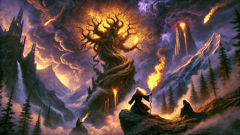
Amirani’s plan took shape over many weeks. With Badri and Usup at his side, he sought the wisdom of the oldest hermit in the land—a man who had lived alone in a cave for nearly a century, said to possess secrets passed down from the dawn of time. The hermit’s beard was as white as snow, and his eyes held memories older than any living tree. He listened as Amirani spoke of his intentions and, after a long silence, revealed the path to the gods’ realm: "Follow the river to its hidden source, where the earth breathes fire. There you will find the gate to the heavens. But beware—the gods guard their gifts jealously."
Guided by this cryptic advice, Amirani and his friends set out before dawn, carrying nothing but courage and faith. Their journey took them through frozen forests, across icy torrents, and up into the realm where clouds grazed the earth. Along the way, they faced challenges designed to turn them back—wolves howling in the dark, avalanches set loose by unseen hands, shadows that seemed to whisper warnings. But Amirani’s will was as ironclad as the chains that would one day bind him. He pressed on, leading his friends with quiet strength.
At last, they reached a hidden valley where the ground pulsed with strange warmth, and a single tree, ancient beyond imagining, stood leafless but alive. Its roots burrowed deep into the mountain’s heart, and at its base glowed a fissure filled with golden flames—the very source of divine fire. The air shimmered with power, and the boundary between worlds thinned. Amirani knelt before the flame, feeling its heat in his bones. As he reached out, the mountain trembled and the sky darkened.
Suddenly, the gods appeared, their forms shifting between shadow and lightning. At their head stood Ghmerti, the sky god, whose gaze held both sorrow and fury. "Why do you come, child of Dali?" thundered Ghmerti. "This fire is not for mortals. It is the boundary between heaven and earth."
Amirani did not shrink. "The people suffer," he replied, voice steady. "They need warmth, light, hope. If you will not give it freely, I must take it for them."
A tense silence followed. Then, with a cry that split the sky, Amirani seized a branch from the sacred tree, plunging it into the heart of the flame. Fire burst along its length, blinding in its brilliance. The gods unleashed their wrath—lightning struck the ground, winds howled, and stones split. But Amirani clung to his prize, shielding Badri and Usup as they fled back toward the mortal realm.
The journey home was a nightmare of pursuit. The gods sent monstrous beasts and illusions to thwart them. Snow fell so thick it blotted out all sight. At one point, the earth cracked beneath their feet, threatening to swallow them whole. But Amirani pressed on, wounded but unyielding, his determination lighting their way through every shadow.
At last, they returned to the villages. Amirani thrust the flaming branch into the largest hearth, and fire leapt from hut to hut, spreading warmth and hope. The people cheered, wept, and sang songs that would echo through centuries. For the first time, mortals possessed fire—the gift that would change their fate forever. But Amirani knew their joy was not without cost. In the distance, thunder rolled ominously over the peaks. The gods’ vengeance was coming.
Chains and Rebellion: The Punishment of Amirani
The wrath of the gods descended swiftly. Before dawn’s first light touched the valleys, a tempest unlike any seen before swept over the land. Thunder boomed in endless echoes through the canyons; lightning struck the forests, setting treetops alight even as villagers huddled in fear around their newly won hearths. The ground trembled as if mourning what was to come.
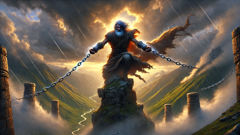
Amirani knew the gods would not let his defiance stand. He gathered Badri and Usup one last time on the edge of a high ravine. "You must live," he told them, "and tell our story. Guard this fire for all generations, so its flame outlasts even me." His friends protested, but Amirani’s eyes held sorrow and conviction. Before they could reply, a whirlwind descended—divine messengers made of storm and shadow seized Amirani, lifting him high above the peaks.
He was carried to the very roof of the world, to a place where the sky pressed close and even eagles dared not fly. There, amid jagged cliffs and howling winds, the gods forged his chains: iron links as thick as tree trunks, set with runes that shimmered with otherworldly power. Ghmerti himself oversaw the binding, his expression a mask of both anger and regret. "You have broken the law that separates gods and men," he declared. "For this you shall suffer, until the end of days or until someone can break what no mortal nor god has broken."
The first days were agony. Frost bit into Amirani’s flesh; wind tore at his wounds. The iron burned cold, its weight pressing into bone and spirit alike. Yet he did not cry out or beg for mercy. In the valleys below, people mourned and prayed, lighting fires each night in his honor. Badri and Usup traveled from village to village, spreading word of Amirani’s sacrifice and urging all to keep their courage bright.
But punishment alone was not enough for the gods. Each year, as snow returned to the peaks, an eagle with iron talons was sent to torment Amirani. The bird circled him at dawn, its wings beating thunder into the air. With relentless precision, it tore at his flesh, feasting upon his liver—a wound that healed each night only to be opened again at sunrise. The pain was unimaginable, yet Amirani never faltered. He sang songs his mother had taught him, recited the names of every river and tree he had ever known, and promised himself never to curse humanity for whom he had suffered.
Over time, his endurance became legend. Travelers braved perilous paths to catch a glimpse of the chained hero, and poets composed verses describing his noble defiance. Even the gods, watching from afar, began to wonder if perhaps they had misjudged him. For in every firelit home, in every story told beneath the stars, Amirani’s spirit lived on—unyielding, proud, and eternally hopeful.
Conclusion
Through ages of storm and silence, Amirani’s chains still clatter against stone in the imagination of Georgia’s people. His story is retold each winter when fires flicker in darkened huts and every spring as wildflowers bloom on the slopes where he once walked free. The legend endures not only as a warning or an explanation for suffering, but as an emblem of resilience—of refusing to yield even when fate seems immovable. The gods’ punishment could not quench Amirani’s spirit; his defiance lit a spark that endures in every act of courage and every hope for justice. In bringing fire to humanity, he gave more than warmth—he gifted mortals the courage to challenge boundaries and endure hardship for what is right. As long as fires burn in Georgia’s valleys and mountains cast their blue shadows over the land, Amirani’s name will live on—a symbol that even when bound by sorrow or adversity, the human spirit can find ways to break free.

